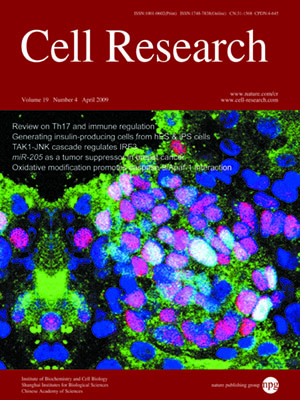
Volume 19, No 4, Apr 2009
ISSN: 1001-0602
EISSN: 1748-7838 2018
impact factor 17.848*
(Clarivate Analytics, 2019)
Volume 19 Issue 4, April 2009: 458-468
ORIGINAL ARTICLES
Tumor suppressor protein C53 antagonizes checkpoint kinases to promote cyclin-dependent kinase 1 activation
Hai Jiang1,2,*, Jianchun Wu1,*, Chen He1, Wending Yang1, Honglin Li1
1Children's Memorial Research Center, Feinberg School of Medicine, Northwestern University, Chicago, IL 60614, USA
2Current address: Center for Cancer Research, MIT, 77 Mass.Ave, Cambridge, MA 02139, USA
Correspondence: Honglin Li(h-li2@northwestern.edu)
Cyclin-dependent kinase 1 (Cdk1)/cyclin B1 complex is the driving force for mitotic entry, and its activation is tightly regulated by the G2/M checkpoint. We originally reported that a novel protein C53 (also known as Cdk5rap3 and LZAP) potentiates DNA damage-induced cell death by modulating the G2/M checkpoint. More recently, Wang et al. (2007) found that C53/LZAP may function as a tumor suppressor by way of inhibiting NF-?B signaling. We report here the identification of C53 protein as a novel regulator of Cdk1 activation. We found that knockdown of C53 protein causes delayed Cdk1 activation and mitotic entry. During DNA damage response, activation of checkpoint kinase 1 and 2 (Chk1 and Chk2) is partially inhibited by C53 overexpression. Intriguingly, we found that C53 interacts with Chk1 and antagonizes its function. Moreover, a portion of C53 protein is localized at the centrosome, and centrosome-targeting C53 potently promotes local Cdk1 activation. Taken together, our results strongly suggest that C53 is a novel negative regulator of checkpoint response. By counteracting Chk1, C53 promotes Cdk1 activation and mitotic entry in both unperturbed cell-cycle progression and DNA damage response.
Cell Research (2009) 19:458-468. doi: 10.1038/cr.2009.14; published online 17 February 2009
FULL TEXT | PDF
Browse 2156


